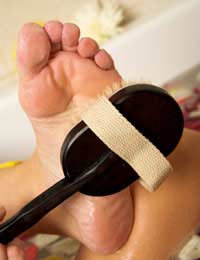General Foot Hygiene

Our feet are subject to a great workload and serve us from birth until death enduring hours of pressure and constant movement. A little common sense and attention can give them the respect they deserve and will help to prevent any problems from occurring.
Good Hygiene Practices
The most important aspect of good foot hygiene lies in the cleansing methods used by each person. Feet should be cleaned at least once a day to prevent bacterial build up, which can result in bad odours. If you are prone to athlete’s foot, eczema, psoriasis or general foot odour it is advisable that highly coloured and scented lotions and products are avoided to reduce the likelihood of irritation to the feet. A basic anti-bacterial agent should suffice or using the product recommended by your GP in the presence of skin disorders. If you suffer from smelly feet, it may be advisable to wash feet more often.For those with athlete’s foot, fresh water should be used for the feet, preferably a shower instead of a bath, and fresh towels that are not to be shared should be used to prevent cross infection.
Cotton socks should be worn instead of synthetic fibres as these allow the feet to breathe and remain cool, and footwear should be altered daily to prevent bacteria from building up.In the event of a corn or a callous developing, always treat using the approved preparations and implements, never try and dig out the root of the corn or callous using sharp objects.
Nail Care
Toenails are often areas that become quite neglected, but an area that also need some attention. Nails should be kept short and clean, and should be cut using appropriate clippers or nail scissors using a single action trimming them straight across. Sharp edges can be reduced using a suitable file or buffer and should not be cut round using the scissors as this can cause the nail to become in-growing.Fungal infections are very common in the toenail and should be treated as soon as they are suspected. Any signs or discolouration or thickening of the nail could indicate an infection, which can be treated by many of the over-the-counter products available in shops and chemists.
What am I Preventing?
Employing good hygiene practices will help to prevent many ailments of the foot and nail. Athlete’s foot and fungal nail infections are very common and can be easily avoided and treated by using some common sense and good cleansing routines.In-growing toenails can be very painful and can be avoided by making sure the nails are trimmed in the correct way. If you are unsure or have difficulty in reaching your toenails, it is advisable to consult a chiropodist.
Soaking feet in warm, not hot, water for at least ten minutes a day followed by exfoliation using a pumice stone can prevent hard skin. Applying moisturiser will also help keep hard skin at bay. Cracked heels, corns and calluses will also be prevented if hard skin is kept under control.
Good hygiene practices will help to keep feet in good condition and will aid the prevention of many of the common foot complaints. Knowing that your feet look and smell good will also help give you confidence and feel better about yourself.
Business Energy With a Difference
If you are looking for business energy or need advanced solutions like remote energy monitoring, new supplies, downgrading or upgrading capacity, have a no obligation chat with Purely Energy.
To find our more get in touch here. or call 0161 521 3400.
- Hyperhidrosis: Overcoming Excessive Sweating
- Ticklish Feet: Why? and How?
- The Benefits of Foot Massage for Children
- Prenatal Reflexology Explained
- Using Detox Foot Patches
- How to Get into Foot Modelling
- Improving Foot Movement With Yoga
- Adult Shoe Fitting Problems
- General Foot Hygiene
- Feet Facts
- Anatomy of the Foot



